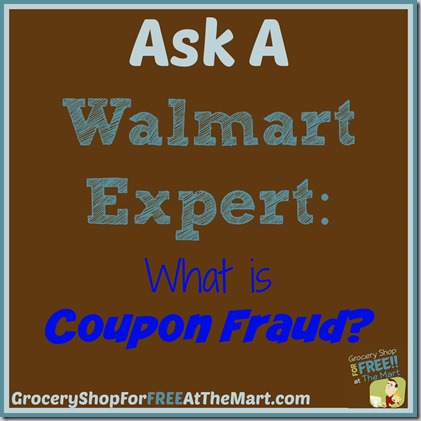Ask a Walmart Expert: What is Coupon Fraud?
Since starting this blog I have been contacted by readers many times with questions about couponing, Frugal Living, Walmart’s policies and procedures, and various other little things. I figure if one person is wondering about it, there might be others so this will be an on-going feature to answer the most common questions that come up. If you have a question, please check out the master list of Ask A Walmart Expert articles to see if your answer is there already or contact me and I’ll do what I can to help you out.
What is Coupon Fraud?
Coupon fraud is one of those hot-button topics in the couponing world that very few people really understand. I cannot tell you how many times in my blogging life I have seen a new couponer say they used a coupon in a way that was maybe not exactly right and then watched as veteran couponers started shouting “That’s Coupon Fraud!” and telling them will soon be headed to jail. Nothing like the threat of jail time to discourage new couponers!
So let’s take a look at coupon fraud, break it down, look at some examples, and learn how to avoid it. If you would rather hear this discussion than read it, you can listen to the Grocery Shop for FREE Podcast we did on this subject
Let’s define our terms
Fortunately, we have a very nice definition of coupon fraud provided for us by the nice folks at the CIC.
Coupon fraud occurs whenever someone intentionally uses a coupon for a product that he/she has NOT purchased or otherwise fails to satisfy the terms and conditions for redemption, when a retailer submits coupons for products they have not sold or that were not properly redeemed by a consumer in connection with a retail purchase; or when coupons are altered/counterfeited. These activities are almost always in violation of Federal, State or local laws.
Coupon fraud costs consumer product manufacturers hundreds of millions of dollars every year.
Coupon fraud also increases costs for consumers and makes it more difficult for honest consumers to legitimately use coupons.
Sounds serious! The CIC gives us 3 areas coupon fraud can occur. Let’s take them in reverse order since it’s really the first one that applies to most couponers so we will save that one for last.
Coupons that are altered/Counterfeited
Most of us don’t counterfeit coupons but does happen. In fact you can read about a Louisiana man Charged with Selling Millions of counterfeit coupons or the $40 Million Counterfeit Coupon ring that was broken up a few years ago. This also includes photocopying coupons. Suffice it to say, if you are involved in trafficking counterfeit coupons, you will be found and you will face charges.
Retailer Submits Coupons for Products that have not been sold
This is far less common but you can read about a time Walgreen’s was Accused of Improper Coupon Redemption here. I’m sure there are smaller chains that try to redeem coupons that weren’t properly used but I’m also sure it is fairly rare.
Now let’s look at what we are usually talking about when we say Coupon Fraud.
Someone intentionally uses a coupon for a product that he/she has NOT purchased or otherwise fails to satisfy the terms and conditions for redemption
If you ever hear someone say Coupon Fraud, this is typically what they mean. Someone has used a coupon in a way that is not consistent with the written restrictions on the coupon.
Here are a few real world examples I’ve seen over the years
- A Softsoap coupon that is only to be use on 8oz bottles or larger being used on a 7.5oz bottle.
- A coupon for a FREE Tena product that says “Up to $5 with no overage” being used on a $3 Tena product with the overage given back in cash to the coupon user
- A coupon for a specific type of Gold Bond Lotion used an a different, trial size sample of Gold Bond Lotion with the overage given back in cash.
- A customer going through the self-serve check out lane and not depositing their coupons in the machine after they check out or scanning the same coupon multiple times. (FYI: Going through self checkout with a lot of coupons is a big red flag to loss prevention. Be assured they are watching you when you do that.)
How to spot a bad coupon
You may on occasion get your hands on a fraudulent or counterfeit coupon. Here are a few things you can look at to tell if it is an invalid coupon.
Look for long expiration dates – Most counterfeit coupons will have expiration dates over a year into the future.
Look for fuzzy barcodes – Most retailers will no longer accept coupons that will not scan so if your barcode is unclear, you probably won’t be able to use it anyway.
Absence of clear instructions – Valid coupons will have a remit address and clear instructions for what the retailer is to do with that coupon after they take it from you. If you have a coupon without this text, it is probably not a good coupon
You can also find a list of current counterfeit coupons here.
It should also be noted that if you got a bad coupon, chances are you bought it off the internet. Avoid doing that by just buying your local paper and getting the coupons from there or printing valid coupons yourself on your home printer.
Are their Consequences to committing coupon fraud?
So we need to be clear here. If you unintentionally misuse a coupon at your local Walmart, nothing is going to happen to you. Walmart will not ban you, (unless you do something else stupid in the store, like whip out your phone and start recording associates) the police will not hunt you down, you will not be going to jail. Don’t believe the crazy people on the internet, they probably aren’t lawyers.
However, if you are committing large-scale fraud like the counterfeiters above, you will absolutely get into some real trouble. In fact just a few Google searches will bring up a treasure trove of criminals, here are just a few.
- JCPenney Cashier Arrested for Giving Coupons to Friends
- Police Seek Family Dollar Coupon Glitchers
- Coupon Guy Arrested
- Walmart Couponers Busted for Illegal Overage
And trust me, you could find more if you spend a few minutes looking.
Over the years I have spoken to many couponers who don’t feel like using coupons incorrectly is any big deal. The crazy thing is they are probably good law-abiding people in every other aspect of their lives but for some reason, they just don’t see misusing coupons as something morally wrong or illegal. They would never dream of stealing from their neighbors but there is just something about the fact that they are taking from a big corporation like Walmart that justifies it in their minds. I don’t know how anyone could make that moral leap as intentionally misusing a coupon is absolutely coupon fraud.. There have been many changes to coupon policies in the last few years as a direct result from couponers misusing coupons and every one of those changes has made life more difficult for couponers, you can read about a few of those changes here.
Coupon fraud is actually very easy to avoid. Just use your coupons correctly and pay attention to any restrictions. That’s it! It’s not brain surgery. Happy couponing!
Click here to get our e-book explaining how to save money at Walmart!








Is the 85% off anything in the store counterfeit that is on Facebook through the end of August?
I waslost checking out at Wal-Mart. 6 coupons on ice cream. The csm voided my transaction and said it wasn’t the right size. She then had me arrested after she voided my whole transaction and took all my coupons that I was trying to use. Also took all the ones I wasn’t going to use after searching my purse? Can they do that?
Have you arrested? I wouldn’t think so.
I would call Walmart corporate.
About 90% of the coupons I use are online coupons from the manufacturer or store website that you print yourself. How can those types of coupons be counterfeited if they’re distributed free by the company anyways?
Joe,
People make fake ones that look like the ones you print. People copy coupons that you can print so they get more thant he allotted amount. There are many ways to counterfeit printable coupons.
What will happen if I had like 8 coupons but I forgot to deposit them? Will the cops come or should I take the coupons back in
Chelsey,
The cops won’t come. Unless the store calls them for something, but, you’ll want to make sure to give them to customer service or call the store and let them know and ask what they’d like for you to do.
Hope that helps,
Aarn
I was in a coupon site and when I went to print the coupons it asked how many cooies, at the time I didn’t know only two were allowed. I’ve already used them all…what should I do?
Don’t worry about it